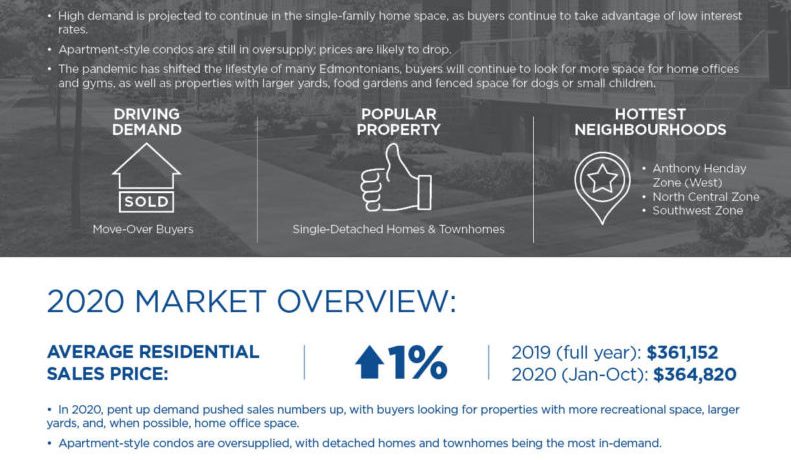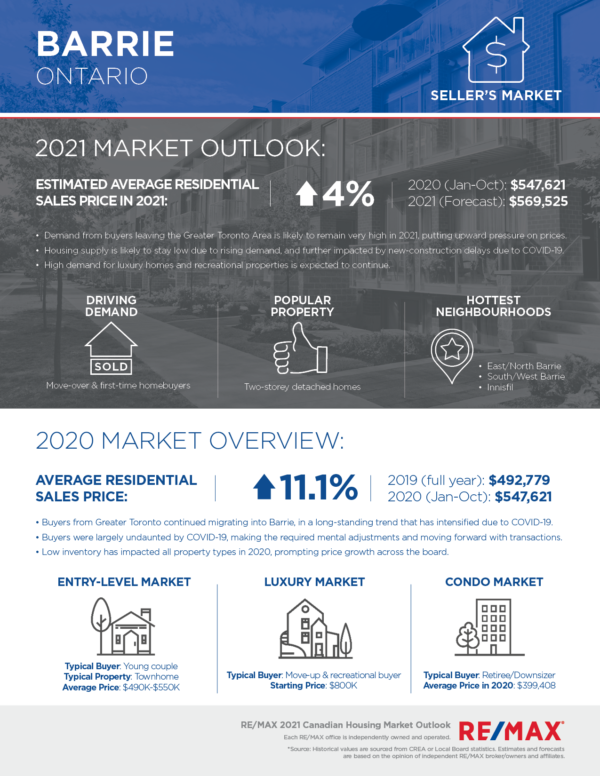.
The average sale price in the Edmonton housing market decreased by 4.3 per cent between 2022 and 2023 (from $418,713 in 2022 to $400,827 in 2023), while the number of sales decreased by 11.4 per cent (from 22,388 in 2022 19,825 in 2023). Edmonton is currently a balanced market, but it’s likely to transition to sellers’ conditions in 2024. The city is expecting a four per cent increase in average residential prices and a decrease of five per cent in sale transactions in 2024.
The top three neighbourhoods likely to be the most desirable in Edmonton in 2024 are Oliver/Downtown; Rutherford/Heritage Valley, a newer development on the deep south perimeter; and Terra Losa, an area north of the West Edmonton Mall. Single-detached homes are expected to see the greatest demand, however new, denser construction developments, the rising cost-of-living and in-home rental suites (including short-term rentals), are priorities for buyers and sellers in the region. When it comes to housing supply, an influx of Ontarians moving to Edmonton is impacting first-time homebuyers, who are also competing with Ontario and BC-based investors searching for the same type of entry-level properties to use as rental investments. Immigration is also a major contributing factor impacting housing supply, likely due to the region’s relative affordability compared to other major cities.
“Similar to broader national trends, rising interest rates have resulted in a cooling effect on the Edmonton market; however, due to the city being one of the most affordable major cities in Canada – with some of the highest overall incomes – we’re seeing strong migration to the region, especially from out of province buyers, and it’s keeping property values stable,” says John Carter, Broker Owner, RE/MAX River City. “The region’s affordability is also attracting immigration from outside of Canada. Historically, newcomers would arrive in Edmonton as a stop on their way to cities like Vancouver or Montreal but now, They’re coming directly to Edmonton and they’re staying in Edmonton where they can find themselves a brand-new construction home within two years arriving in the country, which is not something most other markets can claim.”
Top Trends:
- Edmonton is likely to shift from a balanced market to sellers’ in 2024.
- Rising iInterest rates and interprovincial migration from Ontario are identified as the top two trends impacting the housing market for 2024 in the region.
- Single-detached homes are likely to see the greatest demand in 2024.
- First-time homebuyers are purchasing condos under $200,000 for an opportunity to enter the market and take advantage of entry-level resale.
- First-time buyers in Edmonton are not “waiting-to-see” before getting into the market, unlike the region’s move-up are ($600,000-$900,000 range). Interest rate hikes have reduced their buying power.
______
About the RE/MAX Network
As one of the leading global real estate franchisors, RE/MAX, LLC is a subsidiary of RE/MAX Holdings (NYSE: RMAX) with more than 140,000 agents in almost 9,000 offices with a presence in more than 110 countries and territories. RE/MAX Canada refers to RE/MAX of Western Canada (1998), LLC and RE/MAX Ontario-Atlantic Canada, Inc., and RE/MAX Promotions, Inc., each of which are affiliates of RE/MAX, LLC. Nobody in the world sells more real estate than RE/MAX, as measured by residential transaction sides.
RE/MAX was founded in 1973 by Dave and Gail Liniger, with an innovative, entrepreneurial culture affording its agents and franchisees the flexibility to operate their businesses with great independence. RE/MAX agents have lived, worked and served in their local communities for decades, raising millions of dollars every year for Children’s Miracle Network Hospitals® and other charities. To learn more about RE/MAX, to search home listings or find an agent in your community, please visit remax.ca. For the latest news from RE/MAX Canada, please visit blog.remax.ca.
Forward looking statements
This report includes “forward-looking statements” within the meaning of the “safe harbour” provisions of the United States Private Securities Litigation Reform Act of 1995. Forward-looking statements may be identified by the use of words such as “believe,” “intend,” “expect,” “estimate,” “plan,” “outlook,” “project,” and other similar words and expressions that predict or indicate future events or trends that are not statements of historical matters. These forward-looking statements include statements regarding housing market conditions and the Company’s results of operations, performance and growth. Forward-looking statements should not be read as guarantees of future performance or results. Forward-looking statements are based on information available at the time those statements are made and/or management’s good faith belief as of that time with respect to future events and are subject to risks and uncertainties that could cause actual performance or results to differ materially from those expressed in or suggested by the forward-looking statements. These risks and uncertainties include (1) the global COVID-19 pandemic, which has impacted the Company and continues to pose significant and widespread risks to the Company’s business, the Company’s ability to successfully close the anticipated reacquisition and to integrate the reacquired regions into its business, (3) changes in the real estate market or interest rates and availability of financing, (4) changes in business and economic activity in general, (5) the Company’s ability to attract and retain quality franchisees, (6) the Company’s franchisees’ ability to recruit and retain real estate agents and mortgage loan originators, (7) changes in laws and regulations, (8) the Company’s ability to enhance, market, and protect the RE/MAX and Motto Mortgage brands, (9) the Company’s ability to implement its technology initiatives, and (10) fluctuations in foreign currency exchange rates, and those risks and uncertainties described in the sections entitled “Risk Factors” and “Management’s Discussion and Analysis of Financial Condition and Results of Operations” in the most recent Annual Report on Form 10-K and Quarterly Reports on Form 10-Q filed with the Securities and Exchange Commission (“SEC”) and similar disclosures in subsequent periodic and current reports filed with the SEC, which are available on the investor relations page of the Company’s website at www.remax.com and on the SEC website at www.sec.gov. Readers are cautioned not to place undue reliance on forward-looking statements, which speak only as of the date on which they are made. Except as required by law, the Company does not intend, and undertakes no duty, to update this information to reflect future events or circumstances.
ARCHIVE
The post Edmonton Housing Market Outlook (2024) appeared first on RE/MAX Canada.






 From a national perspective, RE/MAX anticipates a leveling out of the highs and lows that characterized the Canadian housing market in 2019, particularly in Vancouver and Toronto, as we move into 2020. Healthy price increases are expected, with an estimated 3.7-per-cent increase in the average national residential sales price.
From a national perspective, RE/MAX anticipates a leveling out of the highs and lows that characterized the Canadian housing market in 2019, particularly in Vancouver and Toronto, as we move into 2020. Healthy price increases are expected, with an estimated 3.7-per-cent increase in the average national residential sales price.